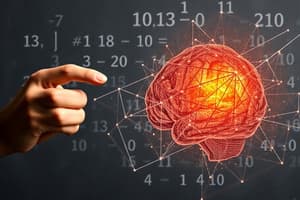Podcast
Questions and Answers
What is an algorithm?
What is an algorithm?
- The ability to produce valuable ideas
- A method that guarantees solving a particular problem (correct)
- A simple thinking strategy
- A sudden realization of a problem's solution
What defines a heuristic?
What defines a heuristic?
- A method that guarantees solving problems without errors
- A simple strategy that is often efficient but may lead to errors (correct)
- The ability to produce novel ideas
- A sudden realization of a solution
What is insight?
What is insight?
A sudden realization of the solution to a problem
Define creativity.
Define creativity.
What is confirmation bias?
What is confirmation bias?
What does fixation refer to in problem-solving?
What does fixation refer to in problem-solving?
What is a mental set?
What is a mental set?
Define functional fixedness.
Define functional fixedness.
What is the representative heuristic?
What is the representative heuristic?
What does the availability heuristic estimate?
What does the availability heuristic estimate?
What is overconfidence?
What is overconfidence?
Define belief perseverance.
Define belief perseverance.
What is intuition?
What is intuition?
What is framing in decision-making?
What is framing in decision-making?
Define language.
Define language.
What is a phoneme?
What is a phoneme?
What is a morpheme?
What is a morpheme?
Define grammar.
Define grammar.
What is semantics?
What is semantics?
What is syntax?
What is syntax?
What are babbling stages in speech development?
What are babbling stages in speech development?
What is the one-word stage?
What is the one-word stage?
What is the two-word stage?
What is the two-word stage?
What is telegraphic speech?
What is telegraphic speech?
What is linguistic determinism?
What is linguistic determinism?
Flashcards are hidden until you start studying
Study Notes
Problem-Solving and Thinking Strategies
- Algorithms: Methodical and logical procedures that guarantee solving problems; more reliable but slower than heuristics.
- Heuristics: Simplified strategies for judgment that speed up problem-solving; often more error-prone than algorithms.
- Insight: Sudden and novel realization of a solution, contrasting with strategy-based methods.
- Creativity: The capacity to generate unique and valuable ideas.
Cognitive Biases and Mental Blocks
- Confirmation Bias: Tendency to seek information that supports existing beliefs while ignoring contradictory evidence.
- Fixation: Inability to view a problem from new perspectives, often leading to stagnation in problem-solving.
- Mental Set: A habitual approach to problem-solving based on past success, which may limit creative solutions.
- Functional Fixedness: The inclination to see objects only in their traditional uses, hindering innovative solutions.
Judgments and Decision-Making
- Representative Heuristic: Evaluates probabilities based on how well something matches a prototype, potentially overlooking relevant data.
- Availability Heuristic: Assesses likelihood of events based on how easily examples come to mind; can distort perceived commonality.
- Overconfidence: Excessive belief in one’s own judgments and abilities; often leads to errors.
- Belief Perseverance: Continuation of holding initial beliefs despite evidence against them.
Language Development
- Intuition: Automatic and immediate feelings or thoughts that occur without conscious reasoning.
- Framing: The presentation of information which can influence decision-making and judgment significantly.
Language Components
- Language: Systems of spoken, written, or signed communication that convey meaning.
- Phoneme: The smallest sound unit in language that can distinguish meaning.
- Morpheme: The smallest meaning-carrying unit in language, including words or parts of words.
- Grammar: A set of rules governing language structure that enables effective communication.
- Semantics: The rules that define meaning within language; includes the study of meaning.
- Syntax: Rules for constructing grammatically correct sentences.
Stages of Language Development
- Babbling Stages: Starting around 4 months old, infants produce varied sounds not yet tied to their language.
- One-Word Stage: From 1 to 2 years old, children primarily communicate with single words.
- Two-Word Stage: Beginning around age 2, children form simple two-word sentences.
- Telegraphic Speech: Early speech format where children convey meaning with minimal vocabulary, often with just nouns and verbs.
Theoretical Perspectives
- Linguistic Determinism: Whorf's theory that language shapes thought patterns and perceptions of reality.
Studying That Suits You
Use AI to generate personalized quizzes and flashcards to suit your learning preferences.




